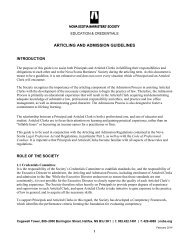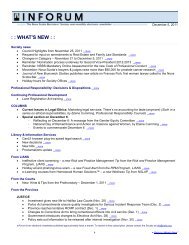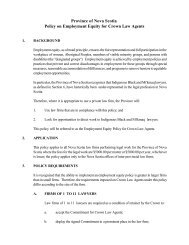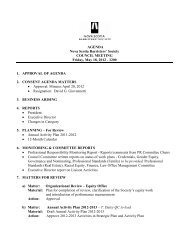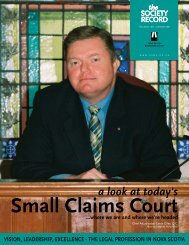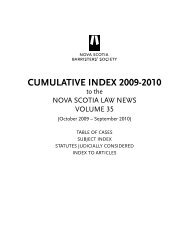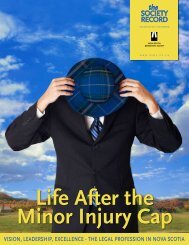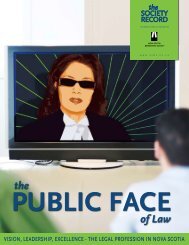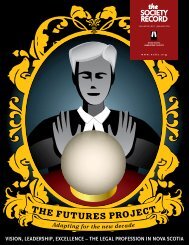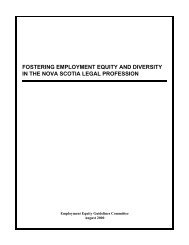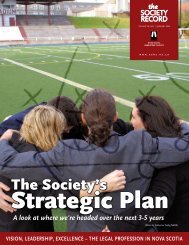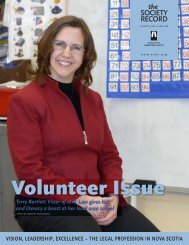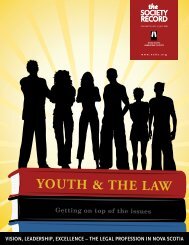SR Vol 27 No 4, October 2009 - Nova Scotia Barristers' Society
SR Vol 27 No 4, October 2009 - Nova Scotia Barristers' Society
SR Vol 27 No 4, October 2009 - Nova Scotia Barristers' Society
- No tags were found...
You also want an ePaper? Increase the reach of your titles
YUMPU automatically turns print PDFs into web optimized ePapers that Google loves.
SummationJarvis GoogooBarrister & Solicitor, Halifax46 The <strong>Society</strong> RecordAt times, we have all chosenthe paths we took inlife for a multitude ofreasons. Other times, we followthe paths for no reason at all other than it may have felt right to do atthe time. I was not one of those people who went to law school becauseI had nothing better to do after undergrad. Halfway through myfirst degree, I decided upon law school for my own grounds. Amongmy many motivations, my strongest was my cousin, Donald MarshallJunior.Growing up, Junior’s story of his wrongful conviction was commonknowledge amongst my family, as well as to the Mi’kmaw nation. I wasalways under the impression that it was “one bad cop who hated Indians”that resulted in Junior being sent to prison for 11 years for a murderhe did not commit. But it wasn’t until I started reading bits andpieces of the Royal Commission and otherarticles in undergrad that I learned it wasmore than just a police office who wrongedJunior; it was a whole system plagued withracism.Junior’s first legal battle falls into a third categorymany of us have been fortunate enough not to encounter: nochoice! Events unfolded and catastrophic fate took place, and it sawJunior’s freedom and liberty wrongfully taken away for 11 years. A fewyears after the Royal Commission, Junior’s next legal battle was hischoice; Mi’kmaw treaty rights! Knowing full well what our ancestorswere promised by the Crown, Junior chose commercial fishery and tofight his way to the Supreme Court of Canada to defend that right.Over time, the decades of fighting took a toll on Junior’s health, andhe passed away on August 6.The recommendations, changes and impacts from both the RoyalCommission and the 1999 Supreme Court of Canada decision are farreaching and enduring on so many levels: from changes to the Canadiancriminal justice system and judicial independence to Mi’kmawparticipation in the Atlantic commercial fishery, and from professionalethics and responsibility to academia and scholarship, to name but afew. So much has happened and will continue to take place because ofthe events in the life of Donald Marshall Junior. Whether it was tragicchance or honourable choice, the impacts of these two significant episodescontinue to reverberate to this day. As one of my peers stated, hedid more in law without a law degree than most people who hold one.With Junior’s incredible story in mind, I went to law school, hopingto be able to make even a fraction of the impact that Junior has had onthe lives of many people. While I don’t know if I can ever achieve this,Junior’s story will always continue to inspire me to keep trying. AlthoughI live life without regrets, I never did get the chance to tell Junior howmuch I respected and admired him, or what a great inspiration he wasto me and to so many others who believe in justice and rights. Afterhe passed away, doubts filled my mind about my decision to never tellJunior how I thought about him. I was so awestruck and humbled byhis battles with the wrongful conviction and Supreme Court of Canadacase, and how he conquered them, that I never had the courage to tellhim that I chose to go to law school because of him.But over the next few days after Junior’s passing, those closest to himtold me that he was proud of me for going to law school and becominga lawyer, the first from my community and the first from our family,and how he felt shy around me to tell me this. My heart filled withpride and my eyes watered deeply when I learned that my hero thoughtabout me in such high regard. The feeling was mutual.Throughout the services, I reflected over and over again about howbetter off countless lives, communities and systems have becomebecause of the sacrifices of Donald Marshall Junior. Whether throughlaw school, the Canadian criminal justicesystem, commercial access to the fishingindustry or just taking up the fight for thegood cause, so many people—Aboriginaland non-Aboriginal, members of variousBar Societies, those involved with theadministration of justice and those whobelieve in change, just to name a few—have been affected, directly orindirectly in some manner or another, by the long-lasting legacy ofDonald Marshall Junior. To play an important part in another person’slife is always commendable. But to play a part that entails great andincredible changes for law, policy and commerce, entities that governand influence so many people on so many levels day in and day out, isnothing short of awesome and amazing.“ … I never had the courage totell him that I chose to go tolaw school because of him.”As all the recommendations of the Royal Commission are yet to befulfilled, and Aboriginal participation in the commercial fishingindustry of the Atlantic provinces continues to grow, the events inthe life of Donald Marshall Junior will continue to evolve numerousaspects of our societies. Like many people, at times I ask myself if itis possible for one person to make a great difference in the lives ofso many others with such a powerful magnitude of change. My firstanswer to that question will always be Donald Marshall Junior.



